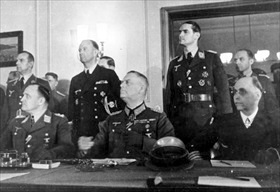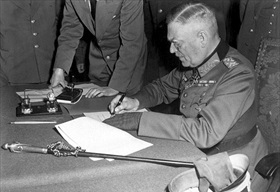HITLER HEADS GERMAN ARMED FORCES
Berlin, Germany · February 4, 1937
On this date in 1937, in a bold, sweeping decree, Adolf Hitler assumed command of the entire German armed forces, or Wehrmacht. He abolished the Reichskriegsministerium (Ministry of War), in the act liquidating the traditional power of the army general staff as the ultimate controller and director of Germany’s armed forces, and created in its place the Oberkommando der Wehrmacht (Supreme High Command of the Armed Forces, or OKW for short), of which he was now its head. Hitler also moved OKW headquarters to Zossen, 30 miles south of Berlin. President of the Reichstag (since 1932), Luftwaffe chief (since 1935), and morphine addict Hermann Goering had coveted such a position as Hitler now assumed. (In July 1940 Hitler would kick the bejeweled, morbidly obese peacock upstairs, giving him the title of Reichsmarshall.) Instead Hitler inserted the mustachioed Gen. Wilhelm Keitel into the top slot at the OKW precisely because Keitel lacked leadership qualities and rarely challenged his boss. (Hitler once told his Minister of Propaganda, Joseph Goebbels, that Keitel “possessed the brains of a movie usher.”) Field Marshal Keitel (since July 19, 1940) remained head of the OKW throughout the war but pitifully lacked real prerogatives of authority, issuing orders to the heads of the army, navy, and air force on behalf of his Fuehrer. Somewhat to his credit Keitel opposed the invasion of France, the aerial bombardment of Britain (Blitz), and Operation Barbarossa, the invasion of the Soviet Union, but he beat a hasty retreat in the face of Hitler’s blistering outbursts. Not surprisingly Keitel acquired several nicknames among his contemporaries in the armed services, among them “Lackey” (“Lackeitel”), a pun on his last name (Lakei in German is “lackey”), and “the Nodding Jackass.” Keitel signed off on orders of dubious legality; for example, the notorious Commissar Order, which stipulated that Soviet political commissars were to be shot on sight, and the Night and Fog (Nacht und Nebel) Decree, which called for the forced disappearance of resistance fighters and political prisoners. Most famously, perhaps, Keitel put his signature to Germany’s unconditional surrender document early on the morning of May 9, 1945. Four days later Keitel was taken into Allied custody. He was tried by the International Military Tribunal in Nuremberg, sentenced to death, and hanged as a war criminal. Keitel was the second highest-ranking German soldier to be tried at Nuremberg after Goering, who escaped Keitel’s fate by taking his own life.
[amazon_carousel widget_type=”ASINList” width=”600″ height=”200″ title=”Recommended Reading” market_place=”US” shuffle_products=”False” show_border=”False” asin=”0815410727,0060580984,0393322521,1612000983,1594202060,0312614926,1400030439,0143122134,1616080213,0142002801″ /]
General Field Marshal Wilhelm Keitel, Head of the Oberkommando der Wehrmacht and de Facto War Minister of Nazi Germany, 1937–1945
 |  |
Above: After Hitler’s suicide on April 30, 1945, Reich President Karl Doenitz, Hitler’s political heir, surrendered his country twice—on May 7 to the Western allies at Reims, France, and May 8 to the Soviets in Berlin. Leading the German delegation on May 8 to Soviet military headquarters in Karlshorst, Berlin, was Chief of the General Staff of the German Armed Forces Field Marshal Wilhelm Keitel (center in left frame). May 8 is generally known in the West as Victory in Europe Day (VE Day). In some Commonwealth countries VE Day is celebrated on May 7, the day the act of military surrender was signed in Reims, France, whereas in post-Soviet states VE Day is celebrated on May 9 because Keitel signed the second surrender document (right frame) after midnight Moscow time. Perhaps owing to German sensibilities May 8 is known as the “Day of Capitulation” (“Tag der Kapitulation”) in that country. Among themselves Germans sometimes call the day Stunde Null, a recognition of their country’s clock being set back to zero.
Hitler’s Lackey, Wilhelm Keitel: End of the Third Reich and His Own
![]()

 History buffs, there is good news! The Daily Chronicles of World War II is now available as an ebook for $4.99 on Amazon.com. Containing a year’s worth of dated entries from this website, the ebook brings the story of this tumultuous era to life in a compelling, authoritative, and succinct manner. Featuring inventive navigation aids, the ebook enables readers to instantly move forward or backward by month and date to different dated entries. Simple and elegant! Click
History buffs, there is good news! The Daily Chronicles of World War II is now available as an ebook for $4.99 on Amazon.com. Containing a year’s worth of dated entries from this website, the ebook brings the story of this tumultuous era to life in a compelling, authoritative, and succinct manner. Featuring inventive navigation aids, the ebook enables readers to instantly move forward or backward by month and date to different dated entries. Simple and elegant! Click 











